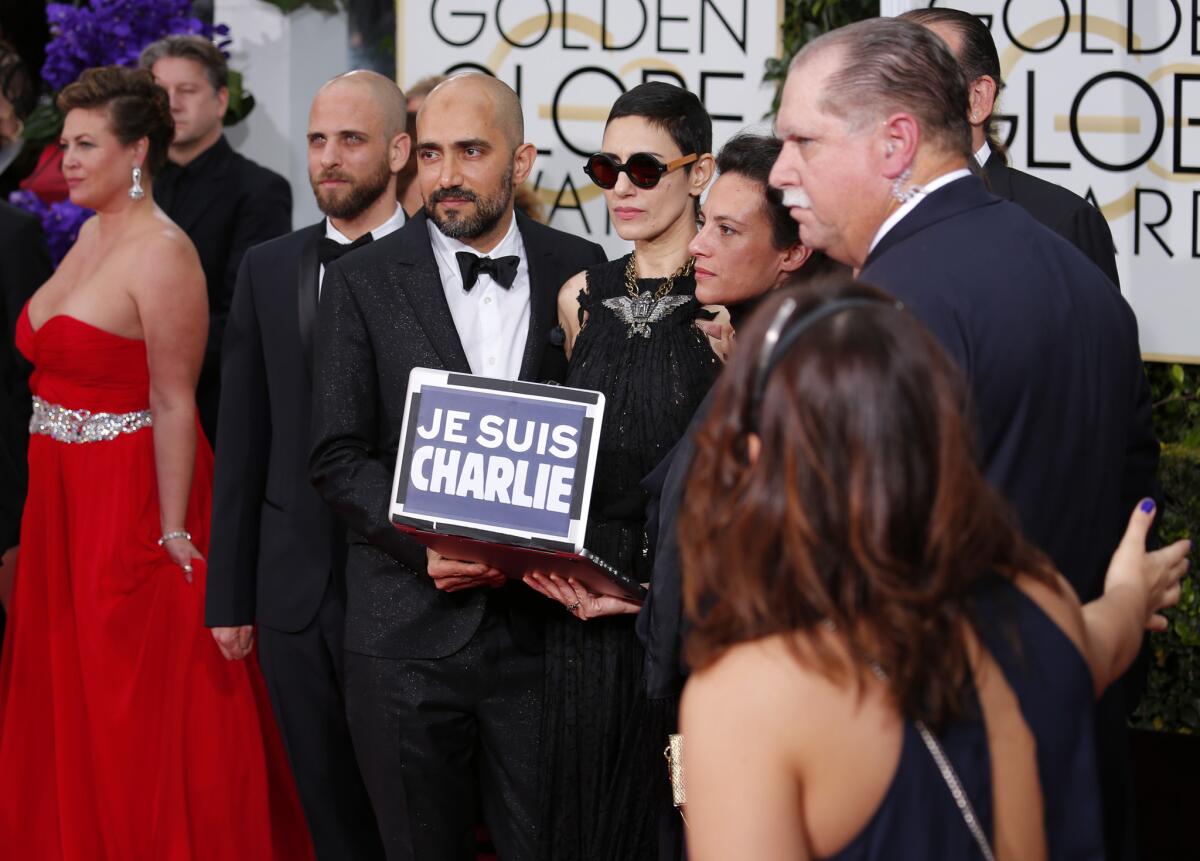Golden Globes: How will the Paris terror attacks factor into the show?

- Share via
When Golden Globes host Tina Fey was asked by reporters at the Television Critics Assn. winter press tour last week about the deadly attacks in Paris at the offices of the satirical magazine Charlie Hebdo, the normally comedic personality took a somber tack.
“Obviously, this is terrible and tragic and upsetting,” she said. “It makes you remember how important free speech is and must be defended.”
Fey will be in the public eye Sunday evening as she and Amy Poehler host the Golden Globes from the Beverly Hilton in Los Angeles. The event is one of the glitziest and most celebratory on the Hollywood calendar, and Fey and Poehler have earned high marks for their amusing and often biting jokes in their previous two years at the helm.
GOLDEN GLOBES 2015: Full coverage
But the deaths of 17 in three terror attacks in Paris last week -- 12 at the magazine’s offices, plus the killing of a police officer Thursday and the murder of four people at a kosher grocery Friday -- introduce a more tragic element to the current moment, and it remains to be seen how the show will choose to pay tribute to it.
The ceremony has a global bent, given its overseeing group, the Hollywood Foreign Press Assn., and it’s expected the HFPA will honor victims of the attacks in a separate moment carved out of the show, an official said Sunday.
Theo Kingma, president of the HFPA, said he would incorporate into his remarks a tribute to the victims of the attacks and a nod to their killers’ assault on free speech; those remarks will come about 30 minutes into the show.
“It is a delicate balance, because it is a celebration,” he told The Times. “But as journalists, we cannot ignore what’s been happening both in the past two months and the past week,” he said, alluding both to the Sony hacking scandal over “The Interview” and the Charlie Hebdo assault. “The issue has to do with creative freedom and journalistic freedom.”
The HFPA counts five representatives from France among its group of some 85 members.
Unlike the Academy Awards, the Globes do not typically have an In Memoriam section, and the overall tone is lighter and quippier than many similar celebrations.
It’s also possible that a winner or presenter will call out to the tragedy during the show.
Look for remarks along those lines by George Clooney, who will have the floor for an extended period as he receives the Cecil B. DeMille award and who has been outspoken on free-speech and humanitarian issues.
A variety of nominees have also already known made their thoughts on the events in Paris. “Into the Woods” star Meryl Streep said on the London red carpet of the film’s premiere that the Charlie Hebdo attacks were “overwhelmingly sad.”
“Foxcatcher” actor Mark Ruffalo tweeted: “What a tremendous loss. A free press is our greatest weapon against tyranny, home and abroad.”
And “Still Alice” actress Julianne Moore tweeted that she was “heartbroken by the loss of life and attack on freedom of expression.”
It’s likely one or more will take the podium to accept a prize Sunday night and offer a serious counterpoint to the fluffy thank-yous. (Show producers, however, might be happy that Ricky Gervais isn’t hosting the Globes. The provocateur entertainer and avowed atheist was up to his truth-through-needling ways on Twitter after the attack, offering, “Blasphemy: A law to protect an all-powerful, supernatural deity from getting its feelings hurt.”)
While acknowledging a tragedy like the Paris attacks would seem like a no-brainer for those with the huge television platform of the Globes, doing so can be tricky. For a celebrity to comment on serious current events among the revelry of an awards show can seem narcissistic, self-important or worse, which is why many often stay away (or are advised by handlers to stay away). Michael Moore famously was derided for his speech against the Iraq war after winning best documentary for “Bowling for Columbine,” an unrelated film, in 2003.
It might make more sense for a nominee whose film traffics in difficult historical subjects -- the nominees for pictures such as “Selma” or “Ida,” for example. Those movies grapple with questions of the painful process of coming to terms with injustice and the value of speaking out against the same, and it would hardly be surprising to see one such winner (“Selma’s” director, Ava DuVernay, or star David Oyelowo, or “Ida” director Pawel Pawlikowski, for example) make mention of the events in Paris.
“The world seems out of control,” Pawlikowski said on the red carpet before the ceremony. “It’s absolutely frightening. But it’s important for democratic societies to keep up certain standards. Stay pure and stay true.” Behind him were a number of “Je Suis Charlie” signs from reporters and others, including AFP staffers.
But there may also be a way to tie the tragedies into the upbeat festivities, bridging the gap between the loss of life across the Atlantic and the celebration taking place inside the room. As she continued her remarks to reporters last week, Streep offered one such connection. “The antidote for” the attacks, she said, “is to live joyously, tolerantly and with attention.”
Twitter: @ZeitchikLAT
The Times’ Trevell Anderson contributed to this report
More to Read
Only good movies
Get the Indie Focus newsletter, Mark Olsen's weekly guide to the world of cinema.
You may occasionally receive promotional content from the Los Angeles Times.











